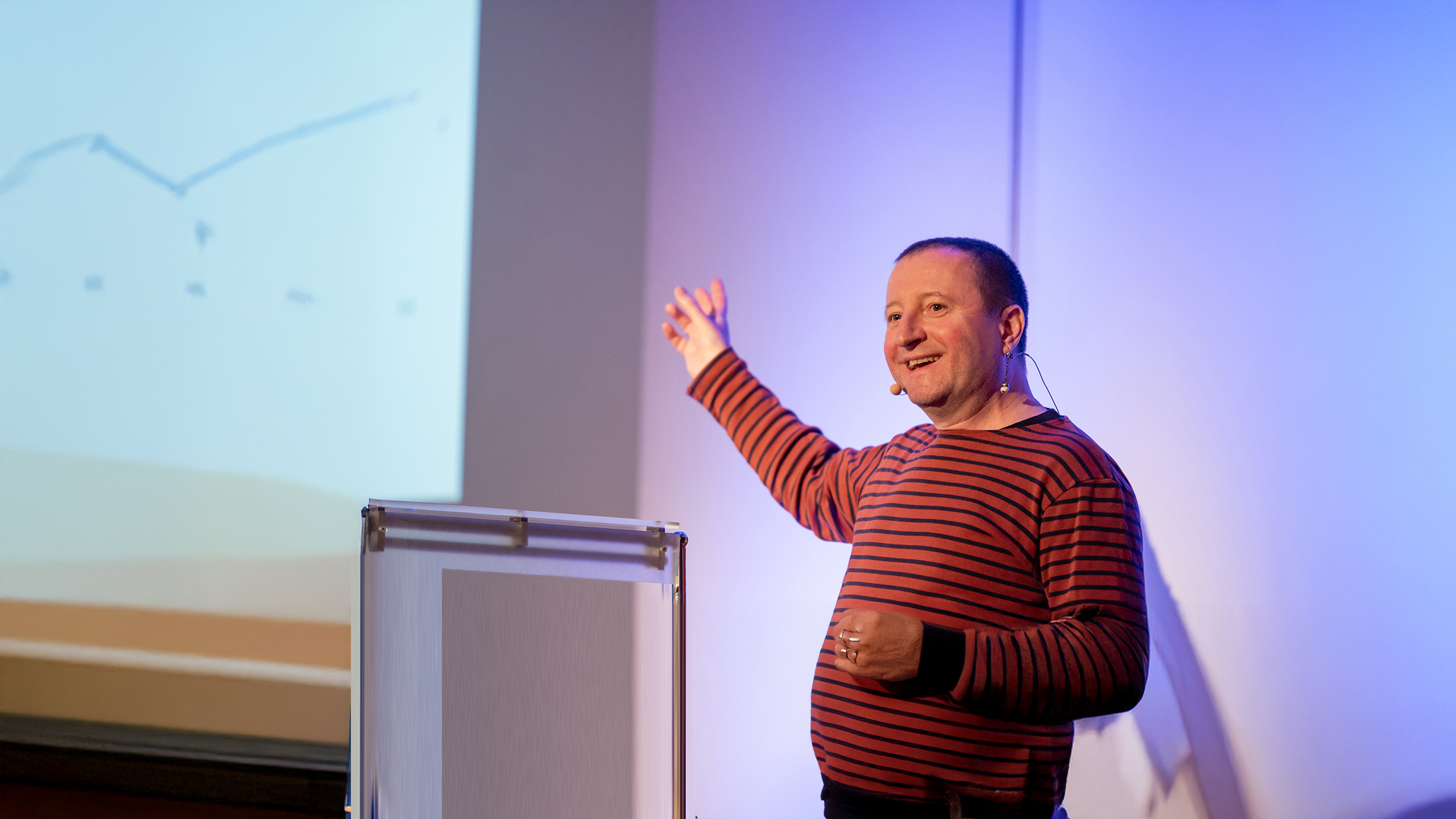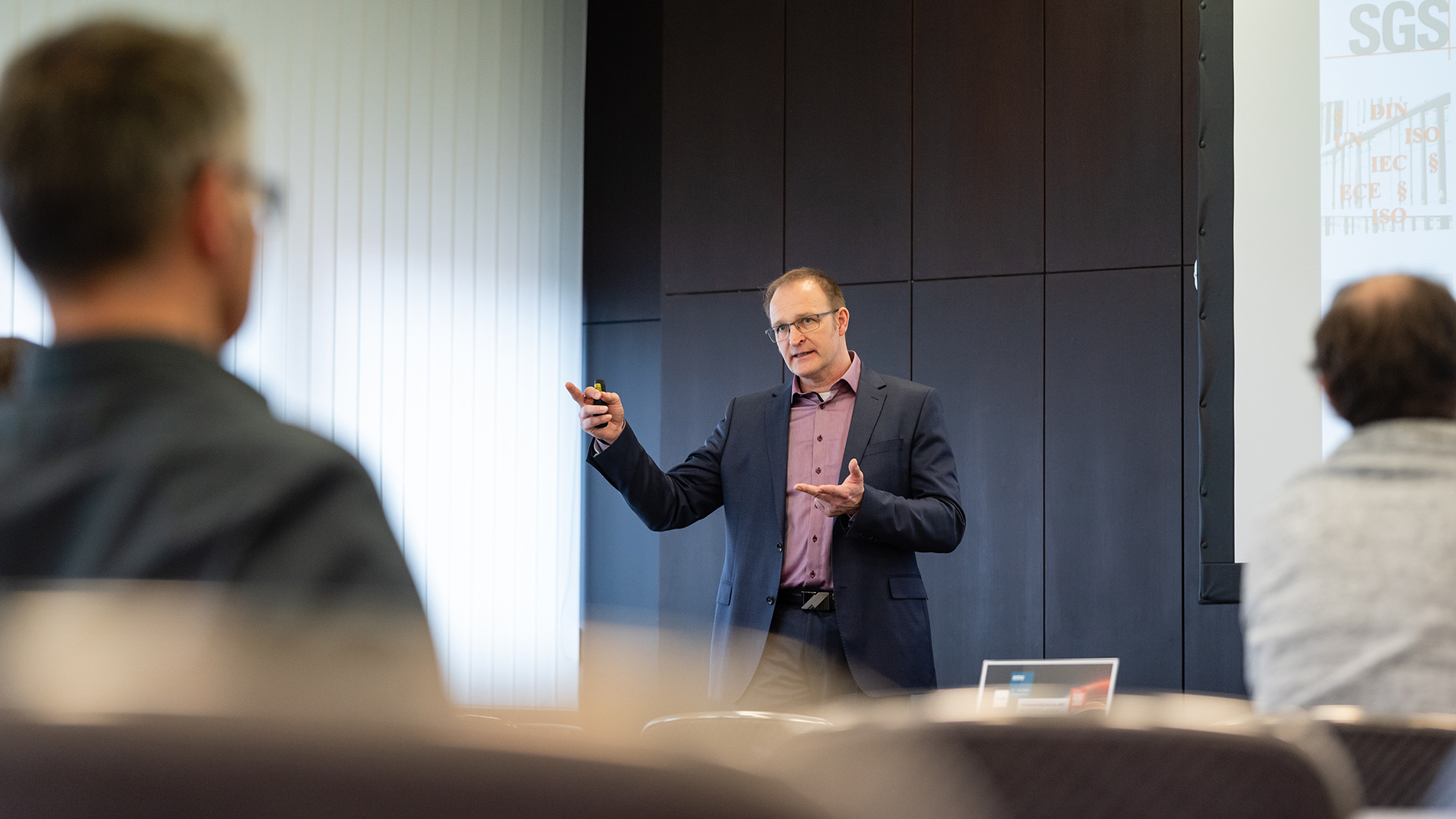Are you conducting research in the field of electromagnetic compatibility or developing practical solutions to everyday EMC challenges? If so, we warmly invite you to present your findings or innovative approaches at our upcoming congress.
The Call for papers is closed
If you have any questions, please contact Sabrina Esposito
What to expect
The EMV is the leading event for electromagnetic compatibility in Europe – and the meeting point for both industry and academia. What makes the event truly unique is its close connection between practical application and cutting-edge research.
Visibility for your research
Present your topic to a broad expert audience covering the entire EMC value chain – from academia and R&D to industrial application.
Publication of your manuscript
Your paper will be published as a citable open-access publication with a DOI in the digital EMV Proceedings and in the official repository.
Direct feedback & networking
Engage in direct exchange with experts from science and industry, receive valuable feedback, and build new connections for research and practical collaboration.
Where theory meets practice: The accompanying trade fair
Discover how research findings from the conference and workshops are translated into real-world applications – live at the exhibition booths of participating companies.
Conference presentation, poster, or workshop – which format suits you best?
Shape your participation at the EMV 2026 according to your goals and resources. Choose from five different formats – from classic technical presentations to poster sessions and interactive workshops.
These formats differ in terms of time commitment, target audience, citation eligibility, first-publication requirements, and the opportunity to be nominated for an award.
New in 2026:
For the first time, we are offering an additional format: the Experiments & Demonstrations session in the exhibition hall. This session gives you the opportunity to present your solutions, prototypes, or measurement results live and in a hands-on environment. You can apply for this format as part of the Call for Papers.
Submissions are welcome in both German and English.
Please note: Product presentations and promotional talks are not permitted in the conference, poster session, workshops, or the new Experiments & Demonstrations session.
Conference presentation
Presentation duration is 20 minutes followed by a 10-minute discussion. Contributions are welcome in both German and English.
Choose from two participation options:
With full paper
If you submit a full paper, it will be published as a citable Open Access publication with a DOI in the digital EMV Proceedings and online repository.
The manuscript must be between 4 and 8 pages in length.
Key requirements:
- The paper must be a first-time publication.
- It must not have been presented at any other conference, even in a different language.
- A high degree of novelty is mandatory.
Your benefits:
You gain scientific visibility, a citable publication, and the opportunity to be nominated for the Best Paper Award or the Young Engineer Award.
Without full paper
In this format, you only submit an abstract, which will be published as part of the conference proceedings.
No full paper and no first-time publication are required, making this option significantly less time-consuming.
Please note: The contribution is not citable and will not be published in the repository.
Poster presentation
As part of the Poster Session on the afternoon of March 24, 2026, you will have the opportunity to present your research in an interactive format. You will display your topic visually on a poster and be available for one-on-one discussions with interested participants.
A special advantage:
The Poster Session is open to both conference attendees and exhibitors, giving you even greater exposure for your research.
Language:
Submissions can be made in either German or English.
Choose from two participation options:
With full paper
For this participation option, you will submit an abstract and create a poster, which you will print and present at the EMV 2026. Additionally, you must submit a full paper with a length of at least 4 to a maximum of 8 pages. This will be published as a citable publication in the conference proceedings and the repository with DOI (Open Access).
Important requirements:
- It must be a first-time publication.
- The paper should not have been presented at any other conferences (including in another language).
- A high degree of novelty is essential.
- You will benefit from the citable nature of your contribution.
Poster requirements:
The poster must be created by the presenter and submitted as a PDF for a quality check to Mesago.
Without full paper
In this participation option, you will submit an abstract, which will be published later in the conference proceedings, and create and print a poster at the EMV 2026.
As no full paper or first-time publication is required, the time commitment is significantly lower.
Please note:
- The contribution is not citable and will not be published in the repository.
- The poster must be created by the presenter and submitted as a PDF for a quality check to Mesago.
Workshop
The workshop duration is 2 hours and 45 minutes (plus a 30-minute break). The language of the presentation can be either German or English.
Workshops are designed to focus on practical applicability and serve as training courses. Case studies or experiments can be used to help convey theoretical content in a practical manner.
Important notes:
Before the workshop, you must provide Mesago with your workshop documentation. This will be made available to all participants in advance as a working document and reference material.
Experiments & Demonstrations
As part of the Experiments & Demonstrations session on the morning of 26 March 2026, in the exhibition hall, you will have the unique opportunity to showcase your latest findings using equipment or to visually demonstrate EMC fundamentals. You will have 30 to 40 minutes for your presentation.
You are responsible for bringing the required equipment, and approximately 20 minutes will be allocated for setup. Please note that all experiments and demonstrations must comply with the technical guidelines of Koelnmesse. Final approval for the demonstration will be granted by Koelnmesse prior to the event.
To apply for the Experiments & Demonstrations session, please submit a meaningful abstract (2-4 pages). Submissions will be evaluated by the committee as part of the Call for Papers, and selections will be made accordingly. Your abstract will later be published in the conference proceedings. No first publication or full paper is required. Please note: The contribution is not citable and will not appear in the repository.
An added benefit: The Experiments & Demonstrations session is accessible to both exhibitors and visitors, allowing you to reach a wider audience for your research.
Contributions can be submitted in both German and English.
Topics of the EMV 2026
Want to know which topics are in focus at the EMV 2026? Our topic overview will help you align your submission with the conference themes.
List of topics
A) Interference sources
1) Narrowband and broadband continuous sources of interference
2) Transient interference sources (lightning, burst, switching, short circuit, NEMP, UWB, HPEM, ESD)
3) Intentional electromagnetic interference (IEMI)
B) EMC in the product development process
1) EMC concepts
2) Numerical simulation and modeling
3) EMC-compliant circuit design (integrated circuits, conductor boards, PCB)
4) EMC and functional safety
C) Risk evaluation
1) EMC system analysis
2) Risk analysis (technical and non-technical aspects)
3) EMC in large or distributed systems
D) Interference suppression measures
1) Grounding and earthing
2) Line topology, cabling
3) Linear, non-linear and hybrid filters
4) Overvoltage protection
5) Shielding, also by means of conductive plastics
E) Test and measurement
1) Spectrum, network and FFT analyzers (Real Time Analyser)
2) Test and measurement methods (comparability, automation)
3) Special features of measurement technology in the GHz range
4) Localization of interference sources
5) Measurement sites (free fields, anechoic chambers, TEM cells, reverberation chambers, etc.)
6) Comparability of different measurement methods
7) Automation of measurement methods
8) Statistics, measurement uncertainties
9) Calibration, traceability, intercomparisons
F) Standardization, Regulation, Approval
1) New approval procedures
2) Changes in standardization
3) Qualification, accreditation and certification
4) International harmonization and approval
5) Regulation, EU, national and international
6) Radio approval at total system level
7) Regulation and standardization in the field of EMC
8) Knowledge transfer to standardization
G) EMC in industrial applications
1) Digitalization (Industry 4.0 / IIOT)
2) Automation and process control technology
3) M2M, RFID technologies
4) Mechatronics
5) Process control engineering
6) Drive technology
7) Production technology
H) EMC in traffic engineering
1) Aircraft, ships, railroads
2) Navigation systems
3) Space travel
I) Electromobility / Motor vehicles
1) EMC aspect s of charging columns and inductive charging
2) Battery management
3) Use of modern converters
4) BUS systems in vehicles (CAN, Flexray, LIN, Ethernet, ...)
5) Autonomous driving (incl. legal aspects)
6) Mobile machines
J) Household, building, information and communication technology
1) Broadband communication systems
2) Power-Line Communication
3) IOT
K) EMC in radio and wireless
1) Near Field Communication (NFC)
2) Mobile communications: GSM, LTE, 5G NR, 6G
3) ISM, SRD, WLAN, Bluetooth, Wi-Fi, DECT
4) Amateur Radio
L) Power Engineering
1) Power electronics
2) Power system perturbations
3) Energy efficiency and EMC
4) Regenerative Energies
5) Inductive charging
6) Wireless Power Transfer (WPT, Inductive charging, radio beam)
7) EMC aspects in the frequency range 2 - 150 kHz
M) Biomedical Engineering
1) EMC in hospital and medical practice
2) EMC of medical devices and systems
3) Active implants
N) Electromagnetic Fields Environment (EMCE)
1) Effect of electromagnetic fields on organisms
2) Personal protection in personal control systems
3) Safety in Electromagnetic Fields
O) AI in EMC
1) Machine learning, artificial intelligence
2) Applications (IIOT / IOT)
3) Design workflow integration
4) Test workflow integration
5) Root cause / failure analysis with AI assistance
6) Solution optimization
7) Effects on systems through AI?
8) AI Act and standardization
9) Cybersecurity and EMC
Submission requirements
By submitting an abstract, you commit to delivering your presentation during the EMV in Cologne from March 24–26, 2026, according to the program announcement.
Submission requirements for conference, poster and Experiments & Demonstrations
To participate at the EMV 2026, please submit the following documents and information online:
- Title of the presentation / poster
- Assignment to a topic
- Selection of presentation format:
"Conference presentation or poster (without Full Paper)", "Conference presentation or poster (with Full Paper)" or Experiments & Demonstrations
- Abstract: A meaningful, 2- to 4-page abstract. Please use our abstract template
- Award application: Indicate if you would like to apply for any awards.
- Short description for the program: Maximum 1,700 characters including spaces.
- Short biography of the speaker: Maximum 600 characters including spaces.
Conference or poster with full paper
The full paper must be created according to the guidelines and submitted to Mesago in time for the production of the digital conference proceedings. The paper will then be reviewed by the conference committee.
When submitting with a full paper, you may apply for the Best Paper and/or Young Engineer Award. Applicants for the Young Engineer Award must be no older than 35 years at the time of submission.
Online registration
The conference, poster or Experiments & Demonstrations speaker (or their company) must pay a mandatory registration fee of €390 (plus VAT), as well as the travel expenses associated with the presentation. The fee covers participation in the entire conference, catering, attendance at social events, and the conference proceedings.
Workshops can be booked for an additional fee, if desired.
Submission requirements for workshops
To present a workshop at the EMV 2026, please submit the following documents and information online:
- Title of the workshop
- Assignment to a topic
- Selection of presentation format: "Workshop"
- Abstract: A meaningful, at least two- to four-page abstract. Please use our template.
- Short description for the program: Maximum 1,700 characters including spaces.
- Short biography of the speaker and co-speakers: Maximum 600 characters each, including spaces.
- Target audience of the workshop
- Prerequisites for the participants
Workshop documentation
By submitting your abstract, you agree to create your workshop documentation according to the guidelines and submit it to Mesago in time for the production of digital handouts.
Online registration and honorarium
Workshop speakers will receive a fee of €780, plus the possibility of a success-related bonus.
The speaker (or their company) is responsible for covering the travel expenses related to the presentation.
Discounted participation
Workshop speakers can attend the entire conference at discounted rates and participate in other workshops at the regular rates.
Each workshop speaker must register online for their own workshop. Registration is free and includes catering on the workshop day as well as participation in the social events.
Selection process
All submitted abstracts will be reviewed and evaluated by the committee. The decision to accept or reject an abstract is based on various criteria, including the timely and complete submission of your materials, the topicality and relevance of the subject in relation to the EMV, the quality and preparation of the submitted documents, and the significance of the abstract.
Important deadlines
Deadline Call for Papers |
Extended until 17 September 2025 |
Notification of speakers |
From mid of November 2025 |
Review of your presentation announcement in the online program |
From December 2025 |
Deadline full paper for the conference and posters |
20 January 2026 |
Full paper review by the committee |
21 January – 4 February 2026 |
Deadline online registration speakers |
3 February 2026 |
Deadline workshop documentations |
6 March 2026 |
Deadline conference presentations |
6 March 2026 |
Deadline poster quality check |
6 March 2026 |
EMV 2026 in Cologne |
24 - 26 March 2026 |



